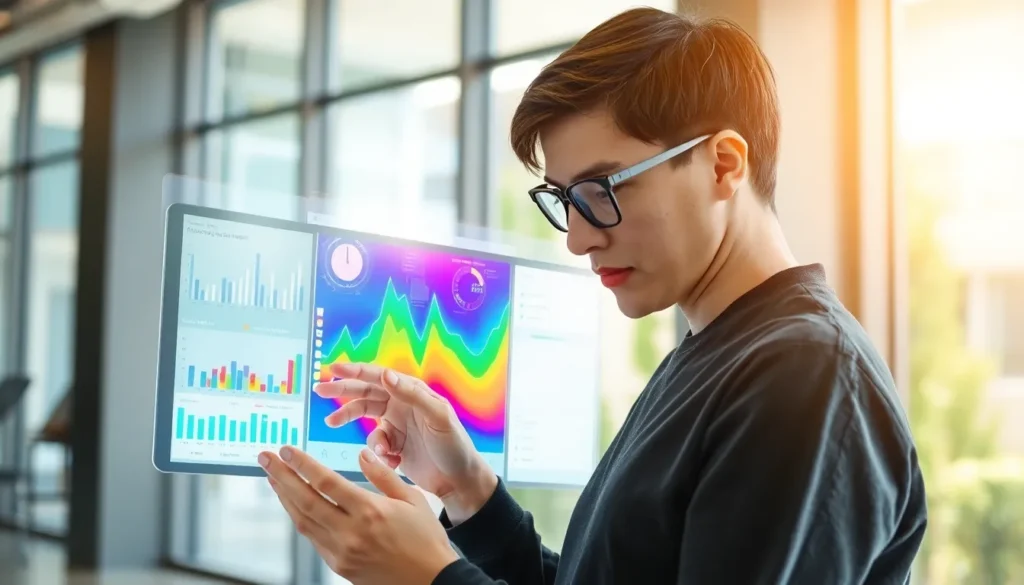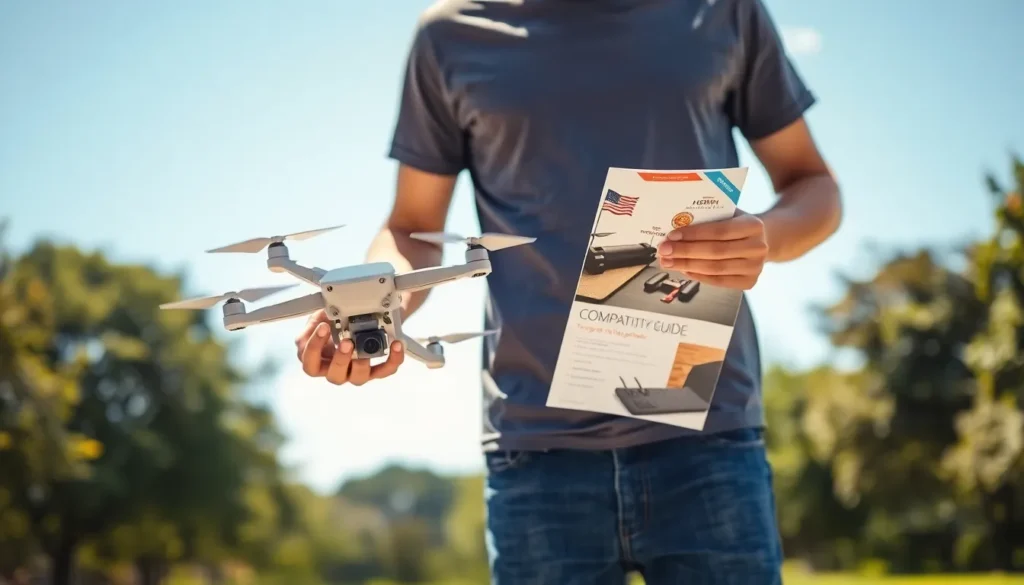As 2025 approaches, mobile technology is set to leapfrog into a future that feels like science fiction. Imagine a world where smartphones not only fit in your pocket but also understand your needs before you do. From AI-driven personal assistants to foldable screens that could make origami jealous, the mobile landscape is evolving faster than a cat video goes viral.
Table of Contents
ToggleMobile Technology Trends 2025
Mobile technology in 2025 focuses on enhancing user experiences through advanced features. AI integration plays a significant role, transforming devices into proactive assistants. Devices will increasingly understand context, making them more responsive to individual needs.
Foldable screens will gain wider adoption, allowing users to enjoy larger displays without sacrificing portability. These screens enhance multitasking by enabling multiple applications to run simultaneously. Companies will prioritize durability and better ergonomics in foldable designs.
5G technology will continue expanding its reach. Increased connectivity speeds will facilitate seamless streaming, gaming, and video conferencing experiences. More users will adopt Internet of Things devices that connect with mobile phones, creating a cohesive ecosystem.
Security will remain a top concern in mobile technology. Enhanced biometric systems, such as facial recognition and fingerprint scanning, will provide more secure access to devices. Companies will also focus on data encryption and privacy controls.
Sustainability will influence mobile design. Manufacturers will prioritize eco-friendly materials and energy-efficient components as consumers demand greener technology. This shift will promote recycling programs and emphasize longer device lifespans.
Augmented reality will revolutionize how people interact with their surroundings. Users will experience immersive experiences in shopping, gaming, and education through AR applications. Improved hardware will support enhanced graphics, making AR more accessible and engaging.
Overall, mobile technology trends in 2025 emphasize user-centric design, security, and sustainability, shaping how individuals connect with the digital world.
Emerging Technologies
Emerging technologies play a crucial role in shaping the future of mobile devices. As 2025 approaches, advancements in mobile technology will transform user experiences in innovative ways.
Artificial Intelligence in Mobile
Artificial intelligence (AI) will revolutionize mobile interactions. AI-driven personal assistants will become more intuitive and context-aware, anticipating user needs based on behavior patterns. Users will find their devices capable of providing tailored suggestions, enhancing daily routines. Voice recognition technology will improve, allowing for more natural conversations. This transformation results in greater efficiency and convenience while using mobile devices across various applications.
5G and Beyond
The rollout of 5G technology will redefine mobile connectivity. Users will experience faster data speeds, lower latency, and improved reliability. Enhanced streaming and seamless multiplayer gaming capabilities will emerge. Internet of Things devices will increasingly rely on 5G for real-time communication, creating an interconnected ecosystem. Furthermore, the groundwork for 6G research is already underway, promising even greater advancements in mobile technology beyond 2025. As networks evolve, mobile experiences will enhance dramatically, meeting the growing demands of users.
User Experience Innovations
User experience innovations in mobile technology will redefine how individuals interact with their devices by 2025. Key advancements, such as foldable screens and enhanced voice controls, will significantly shape user engagement.
Foldable and Flexible Screens
Foldable screens will dominate the market, providing versatility in device usage. Manufacturers are focusing on creating displays that fold without sacrificing quality. Enhanced portability enables larger screens for productivity, making multitasking straightforward. Flexible screens will adapt to various forms, offering users more options and improved functionalities. This transformation allows seamless transitions between compact and expansive formats, appealing to diverse consumer needs.
Voice and Gesture Controls
Voice and gesture controls will emerge as essential features in mobile devices. Improved natural language processing will facilitate smoother interactions, making commands more intuitive. Users will appreciate the convenience of hands-free functionalities, especially in busy environments. Advanced motion sensors will enable gesture-based navigation, creating a more engaging experience. These innovations will enhance accessibility for individuals with disabilities, ensuring everyone benefits from new technologies.
Security Enhancements
As mobile technology progresses towards 2025, security enhancements will become increasingly vital in protecting user data and privacy.
Biometric Advancements
Facial recognition systems will experience improvements in speed and accuracy. Innovations in fingerprint scanning technology will enhance user authentication processes. Devices will also implement multi-factor biometric systems, combining various methods for added security, such as combining facial recognition with voice verification. These advancements will not only streamline user access but also deepen protection against unauthorized intrusions.
Privacy Measures
Data encryption methods will become more robust, ensuring user information remains secure during transmission. Companies will prioritize transparent privacy policies, helping users understand how their data is collected and used. Enhanced privacy controls will allow users to customize settings according to their preferences. Stricter compliance measures will also emerge, aligning with evolving regulations aimed at data protection. With these developments, users can expect an increased emphasis on preventing breaches and maintaining confidentiality.
Market Predictions
Mobile technology is set for significant advancements by 2025, driving various market dynamics. These trends will shape the future landscape of mobile devices and their users.
Consumer Adoption Rates
New features will encourage rapid consumer adoption. Innovations like AI assistants and foldable screens will attract diverse user demographics. Data shows that smartphone penetration will reach approximately 80% by 2025. User interest in foldable devices is expected to exceed 30% as consumers seek versatile solutions. Enhanced voice and gesture controls will also facilitate wider acceptance, making technology more accessible. Increased awareness of 5G benefits will drive users toward advanced mobile experiences, propelling faster market growth.
Impact on Industries
Mobile technology will transform several industries, including healthcare and education. In healthcare, telemedicine will see accelerated growth due to enhanced connectivity. Real-time data access will improve patient outcomes by enabling quicker responses. Education will embrace augmented reality and interactive platforms, enriching learning experiences. Retail will utilize mobile technology for personalized shopping experiences, helping businesses target consumers more effectively. Additionally, the integration of IoT devices will streamline processes across sectors, fostering greater efficiency and connectivity.
As 2025 approaches the mobile technology landscape is set to undergo remarkable transformations. With advancements in AI and connectivity users will experience a new level of interaction and personalization. The rise of foldable screens and enhanced voice controls will cater to diverse needs while making technology more accessible.
Security and sustainability will remain at the forefront of development ensuring user data is protected and environmental impact minimized. Industries like healthcare and education will benefit significantly from these innovations driving efficiency and improving outcomes.
The future of mobile technology promises exciting possibilities that will reshape everyday experiences and redefine how individuals engage with the digital world.





